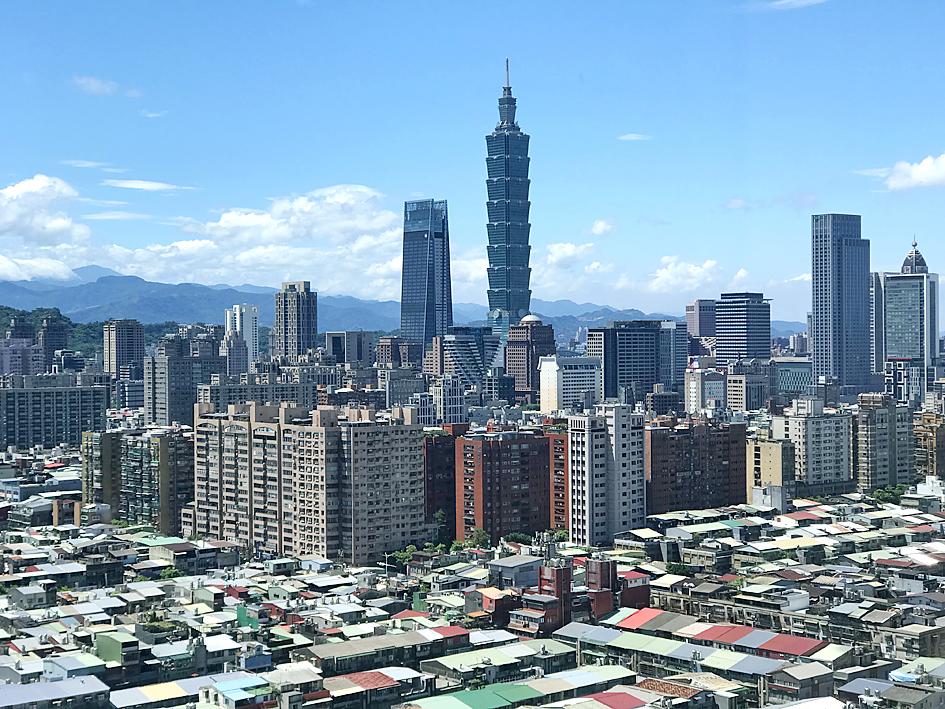Housing transactions last month totaled 17,603 units in the six special municipalities, down 11.2 percent from one month earlier, as the coronavirus pandemic weighed on buying interest, analysts said.
“Prospective buyers turned conservative as the virus outbreak wreaked havoc on major economies around the world, with the US’ GDP shrinking 4.8 percent last quarter,” the worst since the global financial crisis, Evertrust Rehouse Co (永慶房屋) spokesman Jay Hsieh (謝志傑) said.
Although the number of infections is low in Taiwan, consumers have refrained from purchases of durable goods for fear the disease might persist and weaken household incomes, Hsieh said.

Photo: Hsu Yi-ping, Taipei Times
Taichung reported the steepest monthly decline of 21.4 percent to 3,314 units, while Kaohsiung posted a 13.1 percent retreat to 2,684 deals, the broker said, citing data from respective local governments.
Transactions in Tainan slumped 10.8 percent to 1,697 units and weakened 9.8 percent to 3,314 units in Taoyuan.
Taipei and New Taipei City were relatively resilient with declines of 6.9 percent and 5.3 percent to 2,241 and 4,591 deals respectively.
The figures bucked the seasonal trend as the current quarter is normally a high season for the housing market, Hsieh said.
While manufacturing companies in Taiwan have maintained normal operations, service providers, such as restaurants, hotels and retailers saw sharp declines in the number of customers as authorities worldwide ban cross-border travel and locals avoid going out to lower the risk of infection.
The sentiment would erase a 2 percent annual gain in housing transactions in the first four months, Evertrust said.
Sinyi Realty Inc (信義房屋), the nation’s only listed broker, was more optimistic, saying that it has seen sentiment improving from the second half of last month.
Buying interest lost steam in March, but gained some traction after the TAIEX climbed above 10,000 points in the middle of last month, Sinyi research manager Tseng Ching-der (曾敬德) said.
Tseng attributed the stock rally to concerted monetary easing by central banks worldwide to pre-empt a credit crunch and bolster consumer confidence.
The absence of new coronavirus infections for six consecutive days last week in Taiwan would further support the housing market from this month, Tseng said.
In related news, foreigners last quarter bought 332 homes in Taiwan, an increase of 46.3 percent annually and the highest level in 16 years, with floor space of 11,000 ping (36,364m2), H&B Realty Co (住商不動產) said, attributing the increase to capital repatriation.
Additional reporting by staff writer

Taiwan Semiconductor Manufacturing Co (TSMC, 台積電) last week recorded an increase in the number of shareholders to the highest in almost eight months, despite its share price falling 3.38 percent from the previous week, Taiwan Stock Exchange data released on Saturday showed. As of Friday, TSMC had 1.88 million shareholders, the most since the week of April 25 and an increase of 31,870 from the previous week, the data showed. The number of shareholders jumped despite a drop of NT$50 (US$1.59), or 3.38 percent, in TSMC’s share price from a week earlier to NT$1,430, as investors took profits from their earlier gains

In a high-security Shenzhen laboratory, Chinese scientists have built what Washington has spent years trying to prevent: a prototype of a machine capable of producing the cutting-edge semiconductor chips that power artificial intelligence (AI), smartphones and weapons central to Western military dominance, Reuters has learned. Completed early this year and undergoing testing, the prototype fills nearly an entire factory floor. It was built by a team of former engineers from Dutch semiconductor giant ASML who reverse-engineered the company’s extreme ultraviolet lithography (EUV) machines, according to two people with knowledge of the project. EUV machines sit at the heart of a technological Cold

TAIWAN VALUE CHAIN: Foxtron is to fully own Luxgen following the transaction and it plans to launch a new electric model, the Foxtron Bria, in Taiwan next year Yulon Motor Co (裕隆汽車) yesterday said that its board of directors approved the disposal of its electric vehicle (EV) unit, Luxgen Motor Co (納智捷汽車), to Foxtron Vehicle Technologies Co (鴻華先進) for NT$787.6 million (US$24.98 million). Foxtron, a half-half joint venture between Yulon affiliate Hua-Chuang Automobile Information Technical Center Co (華創車電) and Hon Hai Precision Industry Co (鴻海精密), expects to wrap up the deal in the first quarter of next year. Foxtron would fully own Luxgen following the transaction, including five car distributing companies, outlets and all employees. The deal is subject to the approval of the Fair Trade Commission, Foxtron said. “Foxtron will be

INFLATION CONSIDERATION: The BOJ governor said that it would ‘keep making appropriate decisions’ and would adjust depending on the economy and prices The Bank of Japan (BOJ) yesterday raised its benchmark interest rate to the highest in 30 years and said more increases are in the pipeline if conditions allow, in a sign of growing conviction that it can attain the stable inflation target it has pursued for more than a decade. Bank of Japan Governor Kazuo Ueda’s policy board increased the rate by 0.2 percentage points to 0.75 percent, in a unanimous decision, the bank said in a statement. The central bank cited the rising likelihood of its economic outlook being realized. The rate change was expected by all 50 economists surveyed by Bloomberg. The